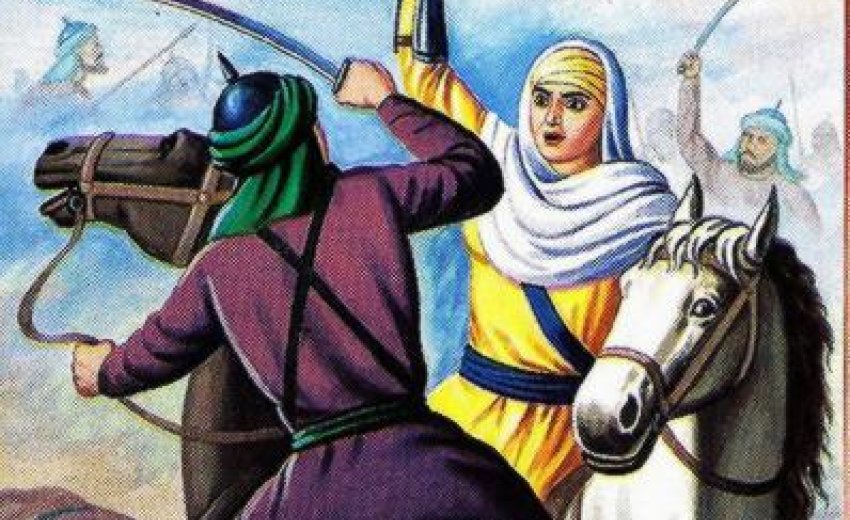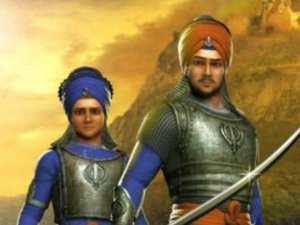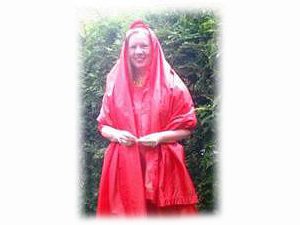Bībī Anūp Kaur's story begins in 1690 in Jallopur Kheṛe near Ammritsar. The only piece of information known about her parents is that her father was called Lachmaṇ Dās Sodhī. At that time the Sodhī1 were divided into two factions, one of which, the one to which Lachmaṇ Dās belonged, argued that the legitimate ninth Gurū was Gurū Teg BahādarJī, who had been found as a result of Gurū Har Kriśan Jī's last words: "Goto Bābā Bakālā near Ammritsar by the river Biās. You will find your Gurūthere." The other faction favoured Dhīr Mal, Bābā Gurdittā Jī's eldest son, who in his turn was a son of Gurū Hargobind Jī. Gurū Teg Bahādar Jī's followers grew tired with the daily discussions and conflicts and left the central Puñjāb for the distant Anandpur Sāhib, and Lachmaṇ Dās Sodhī and his five-year-old daughter Anūp went with them. Anūp, who was a bright, cheerful and comely girl, soon attracted the attention of the two elder Sāhibzādās, Ajīt Singh Jī and Jujhār Singh Jī, the sons of Gurū Gobind Singhs and Mātā Sundarīs, who made her a part of their circle of playfellows.Then it was only a small step to spending time in the Gurū's house every day and being treated like a family member, which as a matter of course included religious instruction and reading and writing Gurmukhī.
The memorable day of April 13,1699, the day on which Gurū Gobind Singh founded the military brotherhood Khālsā in Anandpur Sāhib, which started out with the initiation of the Pañj Piāre and turned the reform movement Sikhī (Sikkhī) into an independent religion, caused the father and the daughter to be among those confessing this religion. Lachmaṇ Dās Sodhī became Lachmaṇ Dās Singh and Anūp became Anūp Kaur.
Ammrit, "the water of life", changed Anūp Kaur and immersed her deeply into the flame of happiness that is VĀHIGURŪ JĪ. The daily prayers inscribed themselves into her soul of their own accord, and her regular visits to the Gurdvārā were a source of never-ending joy. But she also demanded the equal rights for men and women which had been guaranteed by Gurū Nānak, who among other things in this context had written:
Woman
Within woman, man is conceived.
From woman, man is born. To woman he is married.
From woman his children are born.
A man is bound to a woman.
Woman is friend to man.
Nobody– except GOD – can be without woman.
And so she learned to handle swords, shields, spears and horses, just like her brothers in faith did. Other Sikh girls joined her, and soon this troop of girls under her leadership was so skilled in the arts of warfare and self-defence that it was well- known in the whole area. But what Anūp Kaur desired was not fame and glory but the ability to help her distressed and persecuted people after Gurū Arjan Dev Ji's martyrdom – a people that found itself unable to understand why its mere existence and its desire for religious freedom, which it also granted to followers of other faiths, enraged the Muslim Mughals so much. And the young female warriors' skills proved to be useful when Muslims and the Hindū Rājās besieged Anandpur Sāhib for months: They brought the soldiers food from the communal kitchen to the field, served as scouts and messengers, protected the Gurū's family and used weapons.
There is no window in history that could grant us a deeper insight into what happened in Anandpur Sāhib during the tragic winter night of December 21, 17042. But in the still deeply wounded hearts of the Sikh Saṅgat lives a deep sense of their eternal brothers' and sisters' misfortune and of what happened when the sluggish train of horses, riders and those walking on foot was forced to go on its arduous march into an uncertain future.
The sky has been pouring forth rain beyond measure and continues to do so during this fateful night. Smouldering torches brave the heavy rain and spread flickering light. Human beings and animals are exhausted. Hunger burns in their bowels, mixed with a yearning for peace and sleep. The man who is going to lead them mounts his horse, and he feels the gazes of many coming to rest on him, full of hope and fear. Sitting in the saddle, he turns his horse towards them and looks at those who entrusted their lives to him with eyes as heavy as stone. Memories arise and form a kaleidoscope of gloomy colours. There was the stranglehold by the Muslims and Hindūs and no going forward or backward. Attrition on both sides.Then the enemy's offer of safe passage, sworn by their respective sacred books, Kurān and Bhagvat Gītā. They had to accept the offer! Safe passage! The sky is witness! Who would betray them? The leader knows that the wish will not be fulfilled: this is the hunters' night and they are their quarry. For he is the Gurū. Jāṇī Jāṇ.

Gurū Gobind Singh smiles as he looks at his family and Sikhs. It is a smile full of the most profound love interwoven with the most profound pain, for what is dear to him will soon be snatched away. Being able to see and know this is a heavy burden. He tears himself away from his thoughts, turns his horse around and raises his right hand, giving the sign to set off. He drops his hand and the march begins. Not one of them looks back at what used to be their home. Their hearts are burnt out. Who can tell whether the wetness in their eyes and on their cheeks is tears or rain? A baby whimpers with hunger and is suddenly quiet forever. The mother is burdened heavily by what just happened in her arms. Rain spews forth its black pearls. They patter down heavily and unceasingly, washing away hope and driving in fear.
Gurū Jī, followed closely by his family, rides at the head of the train, then the others follow. The continual rain has made the uneven ground almost impassable. Every step men and horses take gets lost in the mud. Mud holes are lurking, hidden stones make people stumble. Everyone tries to keep up with the train, their eyes downcast. Nobody speaks. Breathing becomes difficult. Soon belongings that were intended to be saved become too heavy and are thrown away. Now it is bare life that must be saved. Soon the first Sikh stumbles. He is not old, but ill and haggard. Too much deprivation, too many struggles. The laws of escape are grim: Anyone who falls down is left behind. But some also go beyond themselves when loved ones don't want to leave them: "Don't worry about me. When the enemy come I will have been with VĀHIGURŪ JĪ a long time already. Now run, run for your lives." The sky is a field of black lilies, clouds rushing along as if they were the flight of dead souls, the rain keeps pouring down.
They have crossed the plain without seeing a single enemy. Hope is growing again, very quietly: Maybe the enemy will keep their word? The thick forest senses the fleeing Sikhs on its beaten paths and wants to protect them. It is sighing deeply under the burden of its rain-sodden treetops and because it is unable to prevent the water dropping down on the Sikhs, who are already drenched to the skin. Its sodden ground feels their being lost with every one of their steps. Then he spots the little Sikh girl: "Did I ever see a girl with such a finely shaped face? She seems to be the glittering shadow cast on the earth by the stars. But alas, how pale and haggard she is." And the forest feels the desire to gently take her into its green arms and lay her down on its velvety moss bed, to cover this delicate and haggard body with a gaudy blanket of leaves rustling cheerfully, so that the elf-blue bird can gently sing her to sleep with soft songs. "You are dreaming", the wind hisses, blowing violently through the forest's branches.
The forest sees what Gurū Gobind Singh only has a premonition of: Off the beaten tracks enemy soldiers are lurking, hiding in the thicket of bushes and trees as tall as a man and in the branches of its trees. The forest knows that the noises resounding every now and then are not caused by any of its inhabitants. It will have to let them go into perdition. A groan resounds through the forest as the Gurū and his followers come into the open ground. The Sarsā Nadī flows nearby.

Winter nights are dark and hold back dawn too long, but it was obvious that the torrential rain had turned the gently flowing river into an unpredictable stream. Gurū Jī rides up to the water's edge with worried eyes, and the grip of his hands on the reins tighten. The Sikhs coming out of the forest follow him, and Anūp Kaur is among them. Still hope, and fear. But all hope is dashed at the sight of the river, and fear takes its place: Water, water, nothing but raging water. There is no ferryman to take them across, no ford that would let them pass. Suddenly, and while they are still looking for a solution, savage voices ring out, and the clang of arms resounds all about. The perjurious Hindūs and Muslims are descending on them. Jāṇī Jāṇ– the hunters' night comer over the Sikhs. The death halloo that knows no mercy is sounded, and the weakened Sikhs are surprised and unable to fight its call. A strong hand, life itself, grabs Anūp Kaur and tears her away. When the appalling slaughter is finished only Gurū Gobind Singh Jī, Sāhibzādā AjītSingh Jī, Sāhibzādā Jujhār Singh Jī and forty other Sikhs have managed to reach the far bank of the Sarsā Nadī. Scattered survivors are probably straying around somewhere. They look back. The thought of their slain brothers and sisters and of those that still have death ahead of them makes their hearts turn to stone. How else could this be borne? The Gurū's hoarse voice gives the order "To Camkaur!", and he pulls his exhausted horse around underneath a sky whose clouds are emptied of all water. They reach Camkaur in the evening of the following day, and the noble Caudhrī Budhī Cand offers the exhausted Sikhs quarters, food and a bit of quiet in his house. One question hangs in the air: What shall we do now?
Bībī Anūp Kaur doesn't know how she was able to reach the far bank of the Sarsā Nadī, and neither does she know that her life stands behind her, a slender shape holding the candle of her life in its left hand and using its right hand to try and keep it from being extinguished. Shortly afterwards the young warrior girl meets five Sikh soldiers who, like her, are protected by heaven and who tell her that the enemy pursued Gurū Gobind Singh Jī and his host of forty to Camkaur, that in the ensuing unequal battle the older Sāhibzādās died a heroic death in front of their father, that after sundown only Gurū Jī and five warriors were still alive, and that those five had decided in a Gurmatā that their Gurū was to betaken to safety immediately. Three of them were to accompany him, the two others were to face their last great task on this earth. And so it happened.

As if all of this weren't dismaying enough, they concluded their account with Mātā Gujrī Jī, Sāhibzādā Fatih Singh Jī and Sāhibzādā Jorāvar Jī, who had been betrayed to their worst enemy, Navāb Vazīr Ḳhān of Sarhind, by their former servant, Gangū Brāhmaṇ, because of the bounty on their heads. Now the three were imprisoned in the Thaṇḍā Burj. "Let us ride to Sarhind, then", Anūp Kaur decided. On the way there they came across soldiers of the Mughals, and a battle ensued. When it was finished, two Sikhs had lost their lives. Anūp Kaur was wounded slightly, but the survivors were able to escape. Even before they reached Sarhind they received news of Sāhibzādā Fatih Singh Jī's and Sāhibzādā Jorāvar Jī's cruel execution and of how Mātā Gujrī Kaur Jī had died with a broken heart because of this. "Let us look for our Gurū, then", Anūp Kaur decided again.
They could not remain hidden in an area teeming with enemy, and soon they came across almost two hundred soldiers of the governor of Malerkoṭlā. Anūp's companions were killed, while she fell from her stumbling horse and broke an arm. As she was a woman, she was left alive and taken to Malerkoṭlā, where the governor was given a report on her. The governor was overjoyed when he heard who had been "caught in his net" as he, too, had heard the praises of this remarkable Sikh woman. As he desired her keenly he issued orders to treat her with respect and to have her broken arm taken care of by an expert physician.
Bībī Anūp Kaur Jī was mistrustful of the courtesy shown to her as she probably knew what was in store for her. But still she must have been horrified when she was told that the governor of Malerkoṭlā intended to marry her, for this would not only mean spending her life by the side of a husband she didn't want but also having to accept Islām, and this was what she could bear least. After careful deliberation she decided that killing herself was the only way to be absolved from all this. Her life was shocked about that, for life wants to live for life's sake. When it realized that is wasn't on its own anymore, it said: "So you have come, sister fate and brother death, to fetch her as well. Aren't the many others enough for you? Do you really want her, too? Look how young Anūp is. Is there no way to spare her?"
"Life", fate answered, "we spare her by snatching her away from the brute. Anūp won't die by killing herself, she will continue to live as long as there is a Sikh community. Future generations will praise her in their songs, sing about her love for VĀHIGURŪ JĪ, about her valour and her courage, and she will be young and beautiful forever. Do you really want to cheat her of this "immortality?"
But Anūp Kaur found it very difficult to let the thought of her death be followed by the deed, for the governor had ordered some of his female servants to keep a permanent watch on her and tell him about everything she did. However, as she was very quiet and kept praying all the time, the servants'attention soon dwindled. Still, Anūp had to be patient. Making even the slightest mistake meant there would not be a second chance, and so she patiently bore the ordeal of being asked by the governor about her decision again and again. When he finally realized that, whatever he did, he would not be able to gain her, he ordered his Kāzī to set the wedding for a certain date and to convert her to Islām before that date, using whatever means he thought necessary. This took place in front of her eyes. She had to act now, for the coming night offered the last possibility to carry out what she had decided to.
The young Sikh life trembled when fate made her take up the sharp dagger it had managed to obtain in secret. Some hesitation, perhaps, before the last great step, then fate's power prevailed and Anūp Kaur pushed the dagger deep into her heart. A fiery flame-red flower gives birth to itself. How beautiful she is, the queen of the night, breathing under a velvet-blue sky and drinking the moonlight. As her petals become loose and fall down on her life, one after the other,extinguishing the flame of her life, life with its last breath gives fate and death a forgiving smile, for it knows that it will live.
When early the next morning the Kāzī came to fetch Bībī Anūp Kaur he found her in eternal sleep. She was buried quietly in accordance with Muslim rites.
* Sodhi is still used as a surname/name for a clan. Guru Gobind Singh Ji was from the Sodhi clan.
NOTE: Professor Ganda Singh, on the basis of his research, writes that Banda Singh Bahadur was moved to hear her pathetic story. When he marched upon Malerkotla in 1710, he said that last remains of this brave Sikh lady should not be allowed to rot in a grave. He was not opposed by anybody as the chief of the state had fled before Banda Bahadur reached there. He did not destroy Malerkotla as its chief had advocated mercy for the younger Sahibzadas at Sirhind. Body of Anup Kaur was exhumed and cremated according to Sikh rites as desired by Banda. Thus the martyr Anup Kaur who sacrificed her life at the altar of her faith and chastity was given a decent cremation she richly deserved. She had not embraced Islam and had died a Sikh. She is still remembered respectfully by the people of the area and her sacrifice will never be forgotten.



